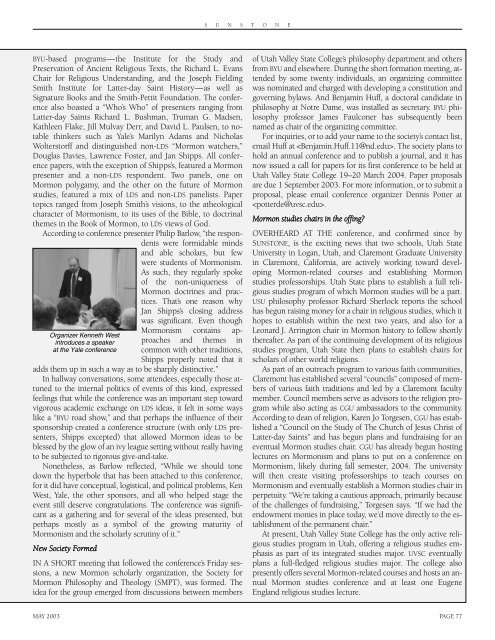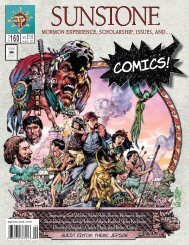the stigma of early return the stigma of early return - Sunstone ...
the stigma of early return the stigma of early return - Sunstone ...
the stigma of early return the stigma of early return - Sunstone ...
Create successful ePaper yourself
Turn your PDF publications into a flip-book with our unique Google optimized e-Paper software.
S U N S T O N E<br />
BYU-based programs—<strong>the</strong> Institute for <strong>the</strong> Study and<br />
Preservation <strong>of</strong> Ancient Religious Texts, <strong>the</strong> Richard L. Evans<br />
Chair for Religious Understanding, and <strong>the</strong> Joseph Fielding<br />
Smith Institute for Latter-day Saint History—as well as<br />
Signature Books and <strong>the</strong> Smith-Pettit Foundation. The conference<br />
also boasted a “Who’s Who” <strong>of</strong> presenters ranging from<br />
Latter-day Saints Richard L. Bushman, Truman G. Madsen,<br />
Kathleen Flake, Jill Mulvay Derr, and David L. Paulsen, to notable<br />
thinkers such as Yale’s Marilyn Adams and Nicholas<br />
Wolterstorff and distinguished non-LDS “Mormon watchers,”<br />
Douglas Davies, Lawrence Foster, and Jan Shipps. All conference<br />
papers, with <strong>the</strong> exception <strong>of</strong> Shipps’s, featured a Mormon<br />
presenter and a non-LDS respondent. Two panels, one on<br />
Mormon polygamy, and <strong>the</strong> o<strong>the</strong>r on <strong>the</strong> future <strong>of</strong> Mormon<br />
studies, featured a mix <strong>of</strong> LDS and non-LDS panelists. Paper<br />
topics ranged from Joseph Smith’s visions, to <strong>the</strong> a<strong>the</strong>ological<br />
character <strong>of</strong> Mormonism, to its uses <strong>of</strong> <strong>the</strong> Bible, to doctrinal<br />
<strong>the</strong>mes in <strong>the</strong> Book <strong>of</strong> Mormon, to LDS views <strong>of</strong> God.<br />
According to conference presenter Philip Barlow, “<strong>the</strong> respondents<br />
were formidable minds<br />
and able scholars, but few<br />
were students <strong>of</strong> Mormonism.<br />
As such, <strong>the</strong>y regularly spoke<br />
<strong>of</strong> <strong>the</strong> non-uniqueness <strong>of</strong><br />
Mormon doctrines and practices.<br />
That’s one reason why<br />
Jan Shipps’s closing address<br />
was significant. Even though<br />
Organizer Kenneth West<br />
introduces a speaker<br />
at <strong>the</strong> Yale conference<br />
Mormonism contains approaches<br />
and <strong>the</strong>mes in<br />
common with o<strong>the</strong>r traditions,<br />
Shipps properly noted that it<br />
adds <strong>the</strong>m up in such a way as to be sharply distinctive.”<br />
In hallway conversations, some attendees, especially those attuned<br />
to <strong>the</strong> internal politics <strong>of</strong> events <strong>of</strong> this kind, expressed<br />
feelings that while <strong>the</strong> conference was an important step toward<br />
vigorous academic exchange on LDS ideas, it felt in some ways<br />
like a “BYU road show,” and that perhaps <strong>the</strong> influence <strong>of</strong> <strong>the</strong>ir<br />
sponsorship created a conference structure (with only LDS presenters,<br />
Shipps excepted) that allowed Mormon ideas to be<br />
blessed by <strong>the</strong> glow <strong>of</strong> an ivy league setting without really having<br />
to be subjected to rigorous give-and-take.<br />
None<strong>the</strong>less, as Barlow reflected, “While we should tone<br />
down <strong>the</strong> hyperbole that has been attached to this conference,<br />
for it did have conceptual, logistical, and political problems, Ken<br />
West, Yale, <strong>the</strong> o<strong>the</strong>r sponsors, and all who helped stage <strong>the</strong><br />
event still deserve congratulations. The conference was significant<br />
as a ga<strong>the</strong>ring and for several <strong>of</strong> <strong>the</strong> ideas presented, but<br />
perhaps mostly as a symbol <strong>of</strong> <strong>the</strong> growing maturity <strong>of</strong><br />
Mormonism and <strong>the</strong> scholarly scrutiny <strong>of</strong> it.”<br />
New Society Formed<br />
IN A SHORT meeting that followed <strong>the</strong> conference’s Friday sessions,<br />
a new Mormon scholarly organization, <strong>the</strong> Society for<br />
Mormon Philosophy and Theology (SMPT), was formed. The<br />
idea for <strong>the</strong> group emerged from discussions between members<br />
<strong>of</strong> Utah Valley State College’s philosophy department and o<strong>the</strong>rs<br />
from BYU and elsewhere. During <strong>the</strong> short formation meeting, attended<br />
by some twenty individuals, an organizing committee<br />
was nominated and charged with developing a constitution and<br />
governing bylaws. And Benjamin Huff, a doctoral candidate in<br />
philosophy at Notre Dame, was installed as secretary. BYU philosophy<br />
pr<strong>of</strong>essor James Faulconer has subsequently been<br />
named as chair <strong>of</strong> <strong>the</strong> organizing committee.<br />
For inquiries, or to add your name to <strong>the</strong> society’s contact list,<br />
email Huff at . The society plans to<br />
hold an annual conference and to publish a journal, and it has<br />
now issued a call for papers for its first conference to be held at<br />
Utah Valley State College 19–20 March 2004. Paper proposals<br />
are due 1 September 2003. For more information, or to submit a<br />
proposal, please email conference organizer Dennis Potter at<br />
.<br />
Mormon studies chairs in <strong>the</strong> <strong>of</strong>fing?<br />
OVERHEARD AT THE conference, and confirmed since by<br />
SUNSTONE, is <strong>the</strong> exciting news that two schools, Utah State<br />
University in Logan, Utah, and Claremont Graduate University<br />
in Claremont, California, are actively working toward developing<br />
Mormon-related courses and establishing Mormon<br />
studies pr<strong>of</strong>essorships. Utah State plans to establish a full religious<br />
studies program <strong>of</strong> which Mormon studies will be a part.<br />
USU philosophy pr<strong>of</strong>essor Richard Sherlock reports <strong>the</strong> school<br />
has begun raising money for a chair in religious studies, which it<br />
hopes to establish within <strong>the</strong> next two years, and also for a<br />
Leonard J. Arrington chair in Mormon history to follow shortly<br />
<strong>the</strong>reafter. As part <strong>of</strong> <strong>the</strong> continuing development <strong>of</strong> its religious<br />
studies program, Utah State <strong>the</strong>n plans to establish chairs for<br />
scholars <strong>of</strong> o<strong>the</strong>r world religions.<br />
As part <strong>of</strong> an outreach program to various faith communities,<br />
Claremont has established several “councils” composed <strong>of</strong> members<br />
<strong>of</strong> various faith traditions and led by a Claremont faculty<br />
member. Council members serve as advisors to <strong>the</strong> religion program<br />
while also acting as CGU ambassadors to <strong>the</strong> community.<br />
According to dean <strong>of</strong> religion, Karen Jo Torgesen, CGU has established<br />
a “Council on <strong>the</strong> Study <strong>of</strong> The Church <strong>of</strong> Jesus Christ <strong>of</strong><br />
Latter-day Saints” and has begun plans and fundraising for an<br />
eventual Mormon studies chair. CGU has already begun hosting<br />
lectures on Mormonism and plans to put on a conference on<br />
Mormonism, likely during fall semester, 2004. The university<br />
will <strong>the</strong>n create visiting pr<strong>of</strong>essorships to teach courses on<br />
Mormonism and eventually establish a Mormon studies chair in<br />
perpetuity. “We’re taking a cautious approach, primarily because<br />
<strong>of</strong> <strong>the</strong> challenges <strong>of</strong> fundraising,” Torgesen says. “If we had <strong>the</strong><br />
endowment monies in place today, we’d move directly to <strong>the</strong> establishment<br />
<strong>of</strong> <strong>the</strong> permanent chair.”<br />
At present, Utah Valley State College has <strong>the</strong> only active religious<br />
studies program in Utah, <strong>of</strong>fering a religious studies emphasis<br />
as part <strong>of</strong> its integrated studies major. UVSC eventually<br />
plans a full-fledged religious studies major. The college also<br />
presently <strong>of</strong>fers several Mormon-related courses and hosts an annual<br />
Mormon studies conference and at least one Eugene<br />
England religious studies lecture.<br />
MAY 2003 PAGE 77

















